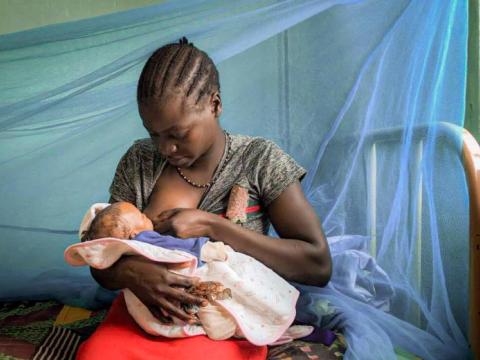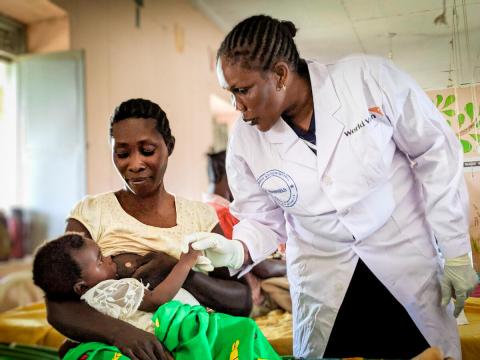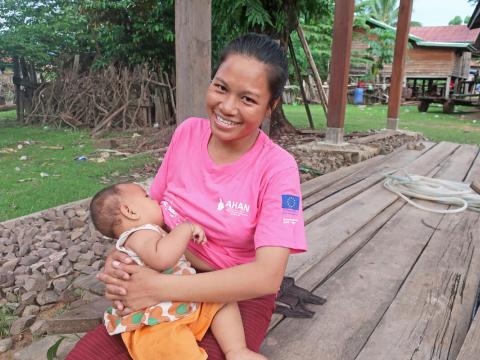
Making breastfeeding work in a hunger crisis
For #WorldBreastFeedingWeek Colleen Emary calls for more investment to ensure women can breastfeed when food is in short supply.
1 August, 2024
Breastfeeding and hunger? You may wonder about the relationship between these. Or you may think it is impossible for a mother to breastfeed her baby when she doesn’t have enough food to meet her own needs – not so fast, there is more to this story. . .
I remember feeling very hungry when I was breastfeeding my children. Eating more food and more often was a priority for me at that time. There is good reason why many breastfeeding mothers feel hungry, since making milk requires energy – on average 500 kilocalories per day more than a woman who is not breastfeeding. That’s more energy than is required in the final months of pregnancy! While there are no special foods required for breastfeeding mothers, UNICEF recommends consuming additional calories through a healthy diet made up of a variety of foods.
At a time when the world is facing an unprecedented hunger crisis, my thoughts turn to mothers around the world who are breastfeeding their children while experiencing hunger themselves.
For millions of breastfeeding mothers today, acute food insecurity is a harsh reality. About 28.9% of the global population, or 2.33 billion people were moderately or severely food insecure in 2023 – meaning they do not have access to adequate, safe, affordable and appropriate foods to meet their needs. We know that food insecurity disproportionally affects women – in 2023, moderate or severe food insecurity affected 26.7% of women compared to 25.4% of men. The current global food crisis makes it increasingly difficult for breastfeeding mothers to access a healthy diet. Not only are these mothers feeling the acute effects of hunger, such as discomfort, tiredness, and difficulty concentrating – they are becoming malnourished. UNICEF estimates that malnutrition among pregnant and breastfeeding women has increased by 25% between 2020 and 2022 among 12 of the hardest hit countries.
Can a malnourished mother breastfeed?
Yes, contrary to a common myth, the majority of malnourished mothers can continue to breastfeed and will continue to produce breast milk that meets the nutritional needs of their infants. Only in cases of severe undernutrition will milk production be impacted. Where a mother’s nutrient intake is insufficient her own nutrient reserves are mobilized to support milk production, at the expense of her own nutritional status. For this reason, breastfeeding mothers who are malnourished need supplementary feeding in order to recover from malnutrition and to protect breastfeeding.
Why is breastfeeding important during a hunger crisis?
At a time when rates of child malnutrition are increasing, breastfeeding provides vital protection against malnutrition and death. Over 820,000 children’s lives could be saved every year among children under five years of age if all children 0 to 23 months were breastfed according to WHO recommendations. In addition, breastfeeding is important for a mother’s own health, helping her to recover from childbirth and reduce the risk of developing certain cancers and type 2 diabetes. Increasing breastfeeding could prevent 20,000 deaths per year among women due to breast cancer.
Breastfeeding is a lifeline in time of food scarcity. It provides total food security for infants as it is a complete food for infants up to six months of age. It is safer and less expensive to provide the mother with more food than to expose the infant to the risks associated with commercial infant formula. Beyond six months of age, breastfeeding continues to be an important source of energy for a growing child providing essential nutrients and helping to prevent malnutrition and micronutrient deficiencies. When food is scarce, breastfeeding provides a vital source of nutrition for young children.
How to support breastfeeding mothers in a time of hunger
Breastfeeding mothers need to be prioritized for support and services. Stress, hunger and disruption to daily routines make breastfeeding more difficult. Stress can affect the flow of a mother’s milk, which can lead to a fussy infant and is often misunderstood as not having enough milk. With reassurance and support, mothers can continue to breastfeed. By providing for the needs of a mother, she can then focus on meeting the needs of her children. Breastfeeding mothers must have access to an affordable nutritious diet, along with micronutrient supplementation to fill the nutrient gaps not covered by the diet, and access to health and nutrition services.
We need to pay more attention to women’s nutrition
Unfortunately, women’s nutrition (including that of breastfeeding women) is a neglected issue. In the last 20 years there has been little change in the global prevalence of undernutrition in women. Today, micronutrient deficiencies affect 69% of women and girls with serious consequences for their own health and that of future generations. Supporting women to breastfeed during the current hunger crisis must be part of a wider agenda to improve nutrition for all women.
Breastfeeding mothers need reassurance and skilled support to continue to nurture, nourish, and protect their babies in times of crisis. Breastfeeding counselling is therefore listed as a priority action in the Sphere Humanitarian Charter and Minimum Standards in Disaster Response. Policy makers, donors, humanitarian responders, community leaders and crisis-affected communities all have a role to play in ensuring support for breastfeeding mothers in emergencies.
Call to Action
World Vision, as a member of the Infant Feeding in Emergencies (IFE) Core Group, calls on decision makers to support this Call to Action:
- Invest resources in routine programmes to improve breastfeeding as a crucial component of emergency preparedness.
- Include adequate provisions for breastfeeding counselling in emergency preparedness plans and policies.
- Ensure that breastfeeding counselling is a component of the minimum package of humanitarian health and nutrition services.
- Identify and document breastfeeding counselling interventions in emergencies to track progress, learn, and inform scale up in emergency settings.
Let’s lay aside our assumptions that women cannot breastfeed in a hunger crisis and focus our efforts to ensure they have the food, care and health and nutrition services that they require to do so.
Read more about World Vision's response to the Global Hunger Crisis here, and how we promote, protect and support breastfeeding here
Colleen Emary is Senior Technical Advisor, Nutrition for World Vision. She is a public health nutritionist, with 20 years of experience working on global nutrition issues. She has provided leadership for design, implementation and evaluation of nutrition programmes, including short-term and remote technical support for several countries in Africa, Asia and Latin America, along with emergency deployments to Bangladesh, Chad, and Democratic Republic of the Congo. She is an active contributor to the global emergency nutrition community, as a member of the Global Nutrition Cluster (GNC) Strategic Advisory Group and of the GNC Technical Alliance Leadership team. Follower her on Twitter @Cremary

